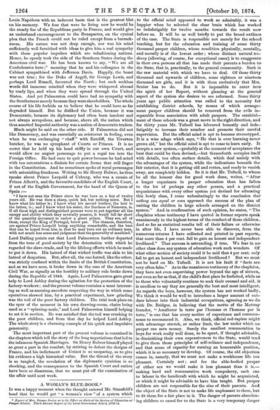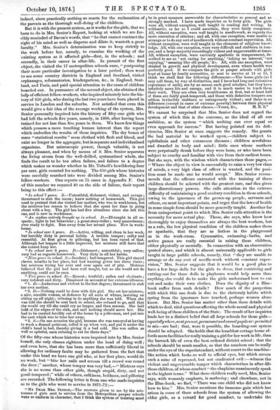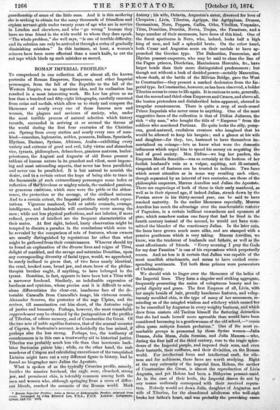A WOMAN'S BLUE-BOOK.* IT was a happy moment when the
thought entered Mr. Stansfeld's head that he would get "a woman's view " of a system which
Report of Mrs. Nassau Senior as to the Effect on Girls of the .9ystem of Education at Pauper Schools. Third Annual Report of the Local Government Board, 1873-74. to the official mind appeared to work so admirably, it was a. happier when he selected the clear brain which has worked so indefatigably for twelve months towards the result now before us. It will be as well briefly to put the broad outlines of the case. The State is responsible not merely for the schoob teaching, but for the education and training of some thirty thousand pauper children, whose condition physically, mentally,. and morally is of the lowest order ; whose distinct natural ten- dency (allowing, of course, for exceptional cases) is to exaggerate in their own persons all that has made their parents a burden to the State, that is, practically, to the general community. Such is. the raw material with which we have to deal. Of these thirty thousand and upwards of children, some eighteen or nineteen, thousand are girls, and it is with them exclusively that Mrs.
Senior has to do. But it is impossible to enter into the spirit of her Report, without glancing at the general aspect of the system she desires to see reformed. Some thirty years ago public attention was called to the necessity for establishing district schools, by means of which arrange- ment pauper children should be removed from the evils in- separable from association with adult paupers. The establish- ment of these schools was a great move in the right direction, and for thirty years Mr. Tufnell has laboured honestly and inde- fatigably to increase their number and promote their careful supervision. But the official mind is apt to become stereotyped.. It is a wise adage which says, "He that is ever learning never grows old," but the official mind is apt to cease to learn early. It accepts a new system,—probably at the moment of acceptance the best that could be then devised,—but thenceforth occupies itself with details, too often surface details, which deal mainly with the advantages of the system, while the indications beneath the- fair exterior, that it is getting old and rotten, and ready to vanish away, are completely hidden. So it is that Mr. Tufnell, to whoms be all the honour due for good work done, writes, "After a longer experience in pauper education than has fallen to the lot of perhaps any other person, and a practical acquaintance with every other system yet devised for educating- this lowly class, I come unhesitatingly to the conclusion that nothing can equal or even approach the success of the plan of uniting the children in large schools arranged on the district system." And in confirmation of such opinion, he states, "The chaplains whose testimony I have quoted in former reports speak unanimously in the highest terms of the conduct of these children.. And so far as statistical results tell of their failure or otherwise- in after life, I have never been able to discover, from the numerous returns I have collected and printed in past reports,. that more than 4 per cent. fail to gain an honest and independent livelihood." That success is astounding, if true. We fear in no other class does any system of education work such wonders. Of what other section of society could it be said that 4 per cent, only fail to get an honest and independent livelihood ? But we must not be hard on Mr. TufnelL It is not his fault if "facts are very often false." As to the unanimous testimony of the chaplains,. they have not even supervising power beyond the age of sixteen, nor even so far as that, if the child's first place be forfeited, while air to those who voluntarily continue to seek their counsel and aid, lit is needless to say they are generally the best and most intelligent.. As regards the boys, however, the system has not worked badly.. We think it would be well to introduce a larger amount of out- door labour into their industrial occupations, agreeing as we do. with Dr. Bridges, in believing that the motto of the Mettray founder, " Ameliorer la terre par l'homme et l'homme par la term," is one that has every motive of experience and common- sense to recommend it. Also, we think, official red-tapism might. with advantage stretch, or rather limit, the law under which no pauper can earn money. Surely the smallest remuneration to boys for work really well done, to be spent, if thought advisable, in diminishing their own expensiveness to the State, would tend to give them those principles of self-reliance and independence, and that sense of capacity for earning an honourable position, which it is so necessary to develop. Of come, the old objection comes in, namely, that we must not make a workhouse life too pleasant. Certainly not ; and for the able-bodied pauper of either sex we would make it less pleasant than it is,— making hard and remunerative work compulsory, each one to labour in the handicraft with which he might be acquainted, or which it might be advisable to have him taught. But pauper children are not responsible for the sins of their parents. And the object of the State is not to make life unpleasant to them, but to fit them for a fair place in it. The danger of parents abandon- ing children so cared for to the State is a very temporary danger indeed, since practically nothing so reacts for the reclamation of the parents as the thorough well-doing of the children. But it is with the present system, as it works for the girls, that we have to do in Mrs. Senior's Report, looking at which we are for- cibly reminded of Bacon's words, that "he that cannot contract the sight of his mind as well as disperse and dilate it, wanteth a great faculty." Mrs. Senior's determination was to keep strictly to the work before her, namely, to examine the working of the existing system as it affected girls—first, in the schools ; and secondly, in their career in after-life. In pursuit of the first object, she visited the 17 metropolitan schools once, "postponing their more particular investigation to a later period ; then went to see some country districts in England and Scotland, visited orphanages, reformatories, kindergartens, &c., in England, Scot- land, and Paris, and paid special attention to the cases of children boarded out. In pursuance of the second object, she obtained the help of efficient fellow-workers, who inquired minutely into the his- tory of 650 girls, who during the last two years have been placed in service in London and the suburbs. Not satisfied that even this would give a fair idea of the average working of the system, Mrs. Senior personally inquired into the history of fifty-one girls who had left the schools five years, namely, in 1868, after having been trained for not less than five years in them. We know few things which possess a more touching human interest than the report which embodies the results of these inquiries. The dry bones of mere "statistical results" seem clothed with flesh and blood, and exist no longer in the aggregate, but in separate and individualised organisms. But microscopic power, though valuable, is not always pleasant, and when by means of it Mrs. Senior separates the living atoms from the well-drilled, systematised whole, she finds the result to be too often failure, and failure to a degree which makes us wonder whether in Mr. Tufnell's bewildering four per cent. girls counted for nothing. The 650 girls whose histories were carefully searched into were divided among Mrs. Senior's fellow-workers. One reports on 75 cases in Appendix F. Out of this number we counted 40 on the side of failure, their report being to this effect
"In school 7 years. S.—Untruthful, dishonest, violent, and savage ; threatened to stab the nurse; knew nothing of housework. This girl used to pretend that she visited her mother, who was in workhouse, but the mistress has reason to believe that she spent her time in going about with a boy. The girl has had five situations since she left this one, and is now in workhouse.
"An °Than entirely brought up in school. D.—M-taught in all re- spects; light in her behaviour ; a great story-teller ; very quarrelsome; ever ready to fight. Run away from her second place. Now in work- house.
"In school over 5 years. .D.—Active, willing, and clean in her work, but horribly dirty in personal habits. A terrible temper; sulky and resentful. At first given to pilfering, but has been cured of that. Although her temper is a little improved, her mistress still fears that she cannot keep her. "In school over 8 years. L).—Dishonest; untruthful ; very sullen; very bad as regards housework. Very dirty in all her habits. "Nine years in school. S.—Insolent; bad-tempered. This girl stayed eleven months in her place, but had warning given her three times ; her mistress trying her over and over again out of pity. Mistress believed that the girl had been well taught, but as she would not do anything, could not be sure.
"Two years in school. D.—Honest ; truthful ; sullen and obstinate ; very indolent and dirty. Dismissed on account of her extreme idleness.
"1. D.—Audacious and violent to the last degree; threatened to stab her own mother.
"2. D.—Nothing could be done with this girl. She set her mistress, a nice, sensible woman, at defiance by all sorts of whims, insisting on sitting up all night ; refusing to do anything she was told. When she was told she should be sent back to school, she refused to go, said that she would cry till she could cry no longer, and then scream. She laid hold of the edges of the sink, and said nothing should move her. She had to be carried forcibly out of the house by a policeman, and put into the cart which was to take her away.
"3. S.—On one occasion the girl, because she was annoyed at having to wash a flannel petticoat, rolled it up when wet, and put it under the child's head in bed, thereby giving it a bad cold. She was sullen as well as spiteful, once refusing to eat for three days."
Of the fifty-one whose histories were inquired into by Mrs. Senior herself, she only classes eighteen under the head of doing well ; and even here, that she has been more than sufficiently liberal in allowing for ordinary faults may be gathered from the fact that under this head we have one girl who, at her first place, would do no work, but "bite her nails and scream till a crowd was round the door ;" another, whose temper was very bad,—" Mistress says she is no worse than other girls, though stupid, dirty, and not good-tempered ;" while of others, sulkiness, boldness, and pilfering are recorded. The following letter is from one who made inquiries as to the girls who went to service in 1871-72 :—
" My DEAR MRs. SErtioR,—The answers given to me by the mis- tresses of girls sent to service from the Metropolitan pauper schools were so uniform in character, that I think the system of training must be in great measure answerable for characteristics so general and so strongly marked. I have made inquiries as to forty girls. The girls were all, without exception, well taught in reading and 'writing. In arithmetic, so far as I could ascertain, they were fairly competent. All, without exception, were well taught in needlework, as regards the mere execution of stitches; and all, with one exception, were unable to arrange or to do any sort of needlework without constant supervision. All, without exception, were well taught in the elements of religious know- ledge. All, with one exception, were very difficult and stubborn in tem- per, and a largo majority exceedingly violent and ungovernable at times. All, without exception, were curiously apathetic in temperament, de- scribed to me as not caring for anything," taking no interest," not enjoying," seeming like old people,' (ix. All, with ono exception, wore stunted in growth and physical development, even where health was perfectly good. If we compare the girls at pauper schools with girls kept at home by family necessities, or sent to service at 14 or 15, I think we shall find the following differences :—The home-girls (as I may call them, by way of distinction, and I have had long and extensive experience of such), are by no means such good scholars, but they have infinitely more life and energy, and it is much easier to teach thorn their work. They are often very troublesome at first, but at least half of them are fairly good-tempered, and those with defective tempers are seldom invincibly stubborn or outrageously violent ; and there is no difference (except in cases of extreme poverty) between their physical development and that of other classes.—Yours, &c., M. B. S."
We cannot be surprised that Mrs. Senior does not regard the system of which this is the outcome, as the ideal of all our ambition, as the system "which nothing can ever equal or even approach for success." But having pointed out its defi- ciencies, Mrs. Senior at once suggests the remedy. She grants the bad material to be worked upon,—children subject to ophthalmia and other cutaneous diseases ; children scrofulous and dwarfed in body and mind ; little ones whose mothers were perpetually drunk before they were born, or who have been subject to cruelty and familiar with vice from their earliest hours. But she says, with the wisdom which characterises these pages,— " Where the object in view is successfully to raise a very low class of minds, a very high class of officer is wanted, and the posi- tion must be made one he would accept." Mrs. Senior recom- mends that the officers entrusted with the training of these children should be selected with the greatest care, wad then given
large discretionary powers. She calls attentionoto the extreme difficulty of maintaining a good sanitary condition in these schools, owing to the ignorance of the grown-up people, servants and others, on most important points, and urges that the laws of health in some simple form should be more generally taught. Another far from unimportant point to which Mrs. Senior calls attention is the necessity for more actual play. Those, she says, who know how thoroughly to enjoy themselves are always the best workers, but as a rule, the low physical condition of the children makes them so apathetic, that they are as listless in the playground as in the work-room. Gymnastics, swimming - baths, and active games are really essential in raising these children, either physically or mentally. In connection with an observation quoted above, and which is almost universally applicable to girls taught in large public schools, namely, that "they are unable to arrange or do any sort of needle-work without constant super- vision," Mrs. Senior suggests that it would be a good plan to have a few large dolls for the girls to dress, that contriving and cutting-out for these dolls in playhours would help more than anything else could do to make the girls understand how to cut out and make their own clothes. Does the dignity of a Blue- book suffer from such details? How much of the pauperism with which this one deals is due to the slatternly habits which spring from the ignorance here touched, perhaps women alone know. But Mrs. Senior has matter other than these details with which to deal, vital questions affecting the whole moral and physical well-being of these children of the State. The result of her inquiries leads her to a distinct belief that all large schools for these girls— especially where,a8 at present, permanent and casual pupils orr permitted to mix—are bad ; that, were it possible, the boarding-out system should be adopted. She holds that the humblest cottage home af- fords more facilities for really training a girl for her work in life, than the barrack life of even the best ordered district school ; that the schools should be much smaller, so that the numbers can be really under the eye of the superintendent, without resort to the machine- like action which looks so well to official eyes, but which covers such a mine of repressed, but not eradicated evil :—witness the violent and ungovernable temper which characterises in after-life these children, of whose conduct "the chaplains unanimously speak in the highest terms." What these children really need, Mrs. Senior says, with womanly emphasis, is mothering ; and elsewhere, not in the Blue-book, we find, "There was one child who did not know how to kiss." Mrs. Senior mentions the immense gain which has arisen in some of these schools from the system of allowing the
elder girls, as a reward for good conduct, to undertake the guardianship of some of the little ones. And it is this mothering she is seeking to obtain for the many thousands of friendless and orphan servant-girls under twenty years of age who are in service in London and elsewhere, and who "go wrong" because they have no true friend in the wide world to whom they dare speak. "The whole problem," she well says, "is one of terrible difficulty, and its solution can only be arrived at through a series of gradually diminishing mistakes." In this instance, at least, a woman's scissors have been more effectual than a man's knife, to cut the red tape which binds up such mistakes as sacred.








































 Previous page
Previous page